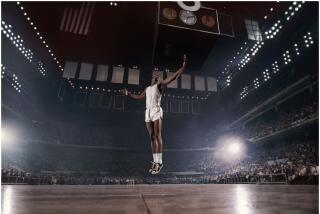NONFICTION - May 24, 1992
- Share via
CROSSING THE POSTMODERN DIVIDE by Albert Borgmann (University of Chicago: $19.95; 184 pp.). By contending that we view the world through a thicket of unconscious memories and assumptions, postmodernism has undermined the modernist ambition of understanding the world and thus shaping it. This has dealt a blow to many academics, who rather than endeavoring to master knowledge must now consider rarefied questions about it, the modern-day equivalent of “How many angels fit on the head of a pin?”
Albert Borgmann, however, chairman of the philosophy department at the University of Montana at Missoula, knows a way out, as he suggests both in his title and in the illustration on his jacket cover: a naked, chaste young man sitting on a mountain of rectangular bricks, the rubble of our modernist, rational society, and watching the sunrise. The painting’s earthy tones and the man’s vulnerable posture convey Borgmann’s hope that he will join the landscape rather than trying to conquer and control it.
Postmodernism’s emphasis on the interrelationships between people and their environment, Borgmann suggests, should make it a positive, empowering philosophy. For it is our failure to realize that each of us is as much object as subject, influenced as well as influencing, that has led to the control mania that has caused so many of the 20th Century’s problems. As Borgmann writes, “We predict the weather and try to control inflation because we are not the weather and not inflation. They are objects other than ourselves, objects we want to subject to ourselves.”
This may sound abstract, but Borgmann tackles topical questions, such as how to overcome the feeling of alienation now apparent in America. Pointing out that the healthiest living environments are those in which human interrelationships are clearly apparent, for instance, Borgmann contrasts the modern supermarket, where you see only “a superficial display of commodities,” with the city a hundred years ago, where you would pass the bakery and its owner, and then the grocer and the grocery, smell the bread baking, and see the produce being prepared and trucked in.
We eschewed these interrelationships for a reason--we wanted to be our own person--but in cutting these ties we lost something, as Borgmann suggests by quoting a poem John Donne wrote after Columbus and Copernicus had shattered the intimate world of the Middle Ages: “The Sunne is lost, and th’earth, and no mans wit / Can well direct him, where to looke for it . . . ‘Tis all in pieces, all cohaerence gone; / All just supply, and all Relation: / Prince, Subject, Father, Sonne, are things forgot, / For euery man alone thinkes he hath got / To be a Phoenix, and that there can bee / None of that kinde, of which he is, but hee.”
More to Read
Sign up for our Book Club newsletter
Get the latest news, events and more from the Los Angeles Times Book Club, and help us get L.A. reading and talking.
You may occasionally receive promotional content from the Los Angeles Times.








